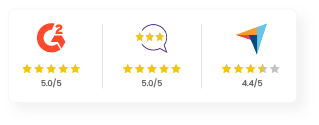How LXP Accelerates Sales Training

Organizations must efficiently onboard, train and enhance the skills of their sales teams to ensure increased business revenue. Sales training is an important business function with the potential to strengthen the bottom line (or completely disrupt it!).
Companies implementing sales training strategies boast a 49% success rate on forecasted deals, surpassing the 42.5% achieved by those without such practices. How can L&D teams best prepare their sales teams for sustained success?
One way is by deploying learning solutions like Learning Experience Platforms or LXP for sales training that drive sales teams by arming them with the knowledge and skills essential for their roles. An LXP also enables companies to train sales teams on the multi-layered skills they require involving a mix of technical, interpersonal and soft skills.
Let’s deep dive into how an LXP is the right tool and platform for boosting sales training.
Revolutionizing Sales Training with AI-Powered LXP
Sales training programs usually include support at various stages, starting from recruitment, onboarding and training, extending to just-in-time resources. These programs also offer continuous support through tools such as Customer Relationship Management (CRM), platforms for information sharing and collaboration as well as analytics that provide data-driven insights.
With an LXP for sales training, organizations can ensure their sales team possesses accurate data and actionable insights, enabling them to strategize effectively or replicate successful approaches. Moreover, they also gain training on valuable information about buyers, including their pain points, preferences and needs.
Equipped with the necessary research and improved resources presented in a ready-to-use format through the LXP, sales teams can allocate more time to prospects with accurately tailored pitches. This targeted approach for sales training optimization with LXP enhances conversion rates. A well-prepared sales representative engages in more meaningful conversations with prospects, ultimately leading to closure of more deals in a shorter timeframe.
Role of LXP in Sales Training
Here’s how an LXP can enhance the effectiveness of the sales training program and expedite sales.
1. AI-driven Recommendations for Targeted Learning
While standardized training for sales teams across the company is an effective method, relying solely on this is insufficient. It is essential to personalize learning approaches so that they align with the diverse profiles within the sales teams.
AI-driven LXP enables this personalization, granting learners access to training that aligns precisely with their needs. Sales employees need strong technical skills so that they have a thorough understanding of the product. They should be able to answer customer queries with confidence because if they lose credibility, the product may lose too.
With targeted learning though LXP, sales personnel receive course recommendations based on factors such as their job profiles, interests, completed courses and the courses favored by their peers that help them bolster their technical skills.
This streamlined approach of creating tailored learning journeys for sales teams with LXP allows enterprises to distill essential training information, ensuring teams do not have to sift through an extensive course library.
2. Short Microlearning Modules
It is likely that the sales team is already juggling a considerable workload. Therefore, it is crucial to ensure that training seamlessly integrates into their existing responsibilities.
LXP for sales training provides mobile-enabled microlearning solutions, allowing salespeople to access training materials in bite-sized packages from any device. Microlearning not only enhances learning retention but is particularly suitable for employees who have limited time for training, such as sales representatives.
Microlearning modules are also a great resource for training reinforcement on areas like sales techniques, soft skills, consumer behaviour etc given that sales teams constantly need these to deal with a changing market.
3. Anytime, Anywhere Learning
Sales teams are frequently on the move, meeting clients, operating in specific regions, or spending significant time outside the office. Additionally, whether they are on the field or on the way to a client meeting, they may find it useful to refresh their knowledge. This can be for answering questions on the spot or simply to enhance their overall preparedness before engaging in a sales pitch
For all of these, traditional, office-centric training methods fall short. They need training materials that they can access regardless of their location. An AI LXP for sales training ensures training is available anytime and from any location.
Most LXPs come with their mobile application that lets sales teams complete training courses while away from their desks. Through the app, they can download courses and complete training offline, with progress automatically syncing upon reconnection to the internet. This is useful for sales team members who spend part of their workday in transit, such as on a train or plane, maximizing their travel time effectively.
4. Easy, Just-in-time Learning
As per HubSpot, 54% of prospects express a desire for a demo, yet only 23% of salespeople conduct a demo during the initial call, resulting in a ‘needs’ disconnect. Recognizing that not all sales professionals can retain every product detail, an LXP with search navigation is an invaluable tool for providing relevant information.
For instance, when a buyer seeks additional information, sellers can swiftly locate a pertinent video through an LXP search, eliminating the need for delays or passing the responsibility. Leveraging customer testimonials or product installation videos available on the LXP can yield significant benefits. Sales teams can efficiently utilize the LXP to shift the conversation, tailoring it to meet the unique needs of the prospect.
5. Collaborative Learning & User Generated Content
The social learning in LXPs for sales training is pivotal to guarantee that the entire sales team is reaping the benefits of top-notch training. Considering that top performers may have limited time to share their insights, it becomes crucial to capture their knowledge for sharing with others.
Facilitating a sense of community among less experienced sales reps can be achieved by allowing subject matter experts to answer questions and provide feedback. Learning from peers also enhances knowledge retention. Additionally, since LXPs easily facilitate user-generated content, individual team members can share their best practices and sales tactics, serving as knowledge for others.
6. Gamification
Gamification in sales training through LXPs proves to be another effective strategy in fostering healthy competition, which is especially advantageous for salespeople who tend to be inherently competitive.
Incorporating games and gaming elements through an LXP for sales training is an excellent method to maintain engagement, competitiveness and motivation of the sales team. LXP games includes features like badges, leaderboards and points for participants. Gamification also encourages effective salesmanship by emphasizing problem-solving skills and illustrating scenarios that depict how a product or service can address a prospect’s challenges in the real-world.
7. Assessments
The Assessments feature in an LXP holds paramount importance for sales training. Assessments validate the knowledge acquired by sales teams, ensuring they possess a proper understanding of the product.
Moreover, assessments also play a crucial role in identifying knowledge gaps within the sales team, allowing for more targeted and efficient training interventions. The personalized learning paths generated through assessment results enable tailored content delivery that help address individual weaknesses. Assessments also offer a quantitative measure of performance, providing tangible data on the strengths and areas for improvement among sales reps.

How Everest Industries Digitalized their Employee L&D
-
Effective onboarding & training solution
- Dynamic system for competency mapping
- Deeper integration between HRMS & learning platforms
Enhancing Product Knowledge through LXP
In contrast to traditional in-person training, digital training allows learners to access and refer courses even after their completion. This ensures that learners have continuous access to training resources, all within a unified platform like LXP for sales training. It is extremely useful for sales personnel who often need to consult training information to verify product or service details for a prospect call or conduct research to respond to a customer’s email.
With an AI LXP for sales training, learning is available continuously, enabling teams to access it whenever needed. Similarly, training managers, company leaders, and marketing teams can introduce new courses, update product training information and add materials throughout the learning process.
Managers can seamlessly provide fresh information by creating new courses or modifying existing ones, ensuring every team member has access to the latest and most relevant information. Continuous product training guarantees the effectiveness and preparedness of the sales team for client interactions.
Wrapping Up
An LXP for sales training is one of the most effective training technologies since it streamlines the journey from learning to sales. Through an AI LXP, sales teams can effortlessly retrieve crucial information, refer to resources during their tasks and consistently undergo training and retraining to maintain competitiveness.
LXP also grants sales teams the flexibility and freedom to learn at their own pace and from any location, empowering them to engage with prospects more effectively.








